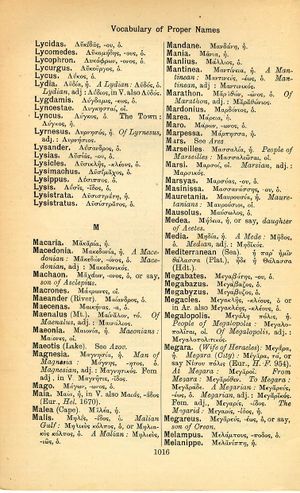Medea
Ἀμήχανον δὲ παντὸς ἀνδρὸς ἐκμαθεῖν ψυχήν τε καὶ φρόνημα καὶ γνώμην πρὶν ἂν ἀρχαῖς τε καὶ νόμοισιν ἐντριβὴς φανῇ → It is impossible to know the spirit, thought, and mind of any man before he be versed in sovereignty and the laws
English > Greek (Woodhouse)
Μήδεια, ἡ, or say, daughter of Aeetes.
Latin > English (Lewis & Short)
Mēdēa: ae (arch.
I gen. Medeaï, Enn. ap. Cic. Tusc. 3, 26, 63; v. Enn. p. 127, v. 292 Vahl.; nom. Mēdē, acc. to id. p. 130, v. 311 Vahl.), and Mēdīa, f., = Μήδεια, a celebrated sorceress, daughter of Æetes, king of Colchis. She assisted her lover, Jason the Argonaut, in obtaining the golden fleece, accompanied him to Greece, and prevented her father, who was in pursuit, from overtaking them, by strewing the sea with her brother's limbs. When Jason afterwards repudiated her, in order to marry Creusa, she killed the children she had had by him, and burned the bride to death in her palace: item ut Medea Peliam concoxit senem, Plaut. Ps. 3, 2, 52; Ov. M. 7, 9 sqq.; Hyg. Fab. 21, 22, 25: ne pueros coram populo Medea trucidet, Hor. A. P. 185.—The subject of tragedies by several authors, v. Quint. 10, 1, 98.—
B Transf.
1 Medea Palatina, i. e. Clodia, Cic. Cael. 8, 18.—
2 Medea nigra, a precious stone, so named after Medea, Plin. 37, 10, 63, § 173.—Hence,
II Mēdēis, ĭdis, f. adj., Medean, magical (poet.): Medeides herbae, Ov. A. A. 2, 101.
Latin > French (Gaffiot 2016)
Mēdēa,¹¹ æ, f. (Μήδεια),
1 Médée [fille d’Éétés, fameuse magicienne] : Cic. Cæl. 18 ; Hor. P. 185 ; Ov. M. 7, 9 || [titre de tragédie] Quint. 10, 1, 98
2 sorte de pierre précieuse : Plin. 37, 173. Media Plin. 37, 173.

